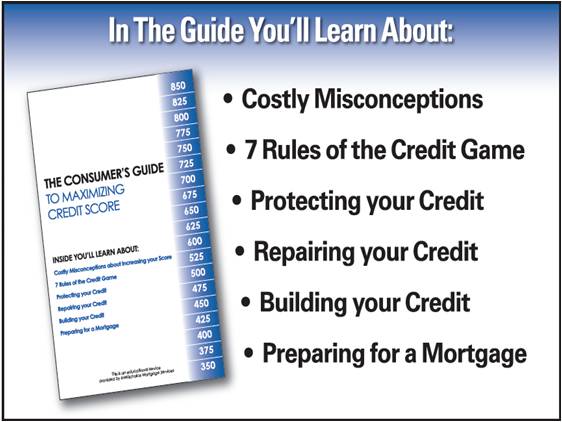Fix Credit Score
How to Fix Credit Score to Qualify For a Mortgage Loan
Credit scores below 700 will increase your loan interest rate and may even prevent you from qualifying for the best loan programs.
When I was a mortgage broker, my job was to help qualify people for the best interest rate and payment terms. That starts with your credit score. I’ve created a free credit repair guide to give you access to the same rules that seasoned mortgage professionals and credit repair companies use everyday to rapidly increase credit scores and show you how to repair your credit.
There are 22 factors that influence your credit score, however, I’ve outlined 7 rules that are critical to quickly fix credit score.
By implementing and continuing to follow these 7 rules, your credit score will remain above 700 for the rest of your life.
To get the most out the information below and fix credit score, please pull a copy your credit report for quick reference. You can obtain a free copy of your credit history at AnnualCreditReport.com. The credit bureaus allow you to get a free copy of your report three times per year to check for errors and protect yourself from identity theft. Pulling your own credit will not lower your credit score.
7 RULES OF THE CREDIT GAME
Rule #1: Keep credit card balances below 30%
If your credit balances are above 30%, try the following:
1. Pay down credit cards to less than 30 percent of the credit limit
2. Ask your credit card company to increase the limit. Here are the questions to ask:
- Will you increase my limit without pulling my credit score?
- If I request a specific limit, will you deny me all together or will you counter offer?
3. If you have multiple credit cards and some have low balances, transfer funds from one card to another so that each has less than a 30% balance
4. If you are 4 months from needing a mortgage, obtain a new credit card and transfer balances so each is less than 30% of the credit limit
Rule #2: Maintain 3 active revolving credit lines
Revolving credit lines are credit cards like Visa, Mastercard, AMEX (they are not department store cards, debit cards or gas cards)
1. The oldest credit cards with the highest balance have the biggest impact on your credit score
2. Wait 6 months between opening new accounts
3. Never close a credit card account
Rule #3: Take yourself off the credit bureau marketing list
Have you ever wondered how you get offers for insurance and credit cards in the mail from companies that don’t even know you? The credit bureaus are huge databases of information and they sell your information to companies that solicit you for new credit and insurance.
By removing yourself from their list, you can not only increase your credit score by 5-10 points but you can also reduce your chances of identity theft.
1. Visit OptOutPrescreen.com and permanently opt-out
Rule #4: Have at least one installment loan on your report that is active or paid off
1. Installment loans are auto loans, leases, boat loans or other credit attached to personal property (furniture, computer)
2. If you purchase furniture or household electronics, make sure it is an installment loan and not just another revolving credit line
Rule #5: Maintain the perfect credit mix
1. One mortgage
2. One installment loan
3. Three revolving credit lines (credit cards)
Rule #6: Review your credit report every 4 months and remove all errors
Looking at your credit report:
1. Concentrate only on high priority errors that happened within the last 2 years
2. High priorities are:
- Negative payment history
- Bankruptcy items that are still showing as past due accounts
- Accounts that are not your
- Collection notices that are not yours
- Social Security Numbers and names that are not yours
- No limit reporting or low limits can hurt
- Legally, only the current collector can report a collection
3. Do NOT focus on date of birth, address, wrong employer, delinquencies older than 2 years, wrong account numbers
4. Verify accuracy of credit limits
5. Check your credit report for account info that is listed more than once
6. Focus only on collection accounts that are less than 2 years old
7. Verify there are no duplicate collections
Rule #7: Negotiate a letter of deletion before a collection is paid
1. A paid current collection is worse than an unpaid collection
2. Do not pay off collections, this will lower your score because you are admitting guilt
3. Collections after 2 years only hurt your credit minimally, after 4 years not at all
4. Try to get the collection deleted from your credit report by receiving a letter of deletion from the creditor or collection agency
- Determine how much you can actually pay
- Call the creditor or collection agency and tell them that your credit is important to you and you are willing to pay $$$$ if they will delete the collection from your credit report
- During the conversation, never admit guilt
- If they agree, ask for an agreement in writing for a “letter of deletion”
- Receive the “agreement for a letter of deletion” before you pay anything
5. Steps to negotiating a letter of deletion from a creditor or collection agency
If you enjoyed these 7 rules, you don’t want to miss receiving a free copy of the Consumer’s Guide to Maximizing Credit Score. It reveals even more secrets of the credit game and will teach you how to fix bad credit.
